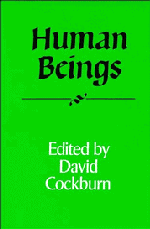Book contents
- Frontmatter
- Contents
- Introduction
- Machines as Persons?
- The Importance of Being Human
- Response to McNaughton
- Response to Diamond
- Real Selves: Persons as a Substantial Kind
- Personal Identity and Brain Transplants
- Personal Identity and the Idea of a Human Being
- Imagination and the Sense of Identity
- Radical Critique, Scepticism and Commonsense
- Getting the Subject back into the World: Heidegger's Version
- Incarnational Anthropology
- How Many Selves Make Me?
- Sartre and Our Identity as Individuals
- Bibliography
- Notes on Contributors
- Index
Personal Identity and Brain Transplants
Published online by Cambridge University Press: 05 February 2015
- Frontmatter
- Contents
- Introduction
- Machines as Persons?
- The Importance of Being Human
- Response to McNaughton
- Response to Diamond
- Real Selves: Persons as a Substantial Kind
- Personal Identity and Brain Transplants
- Personal Identity and the Idea of a Human Being
- Imagination and the Sense of Identity
- Radical Critique, Scepticism and Commonsense
- Getting the Subject back into the World: Heidegger's Version
- Incarnational Anthropology
- How Many Selves Make Me?
- Sartre and Our Identity as Individuals
- Bibliography
- Notes on Contributors
- Index
Summary
My topic is personal identity, or rather, our identity. There is general, but not, of course, unanimous, agreement that it is wrong to give an account of what is involved in, and essential to, our persistence over time which requires the existence of immaterial entities, but, it seems to me, there is no consensus about how, within, what might be called this naturalistic framework, we should best procede. This lack of consensus, no doubt, reflects the difficulty, which must strike anyone who has considered the issue, of achieving, just in one's own thinking, a reflective equilibrium. The theory of personal identity, I feel, provides a curious contrast. On the one side, it seems highly important to know what sort of thing we are, but, on the other, it is hard to find any answer which has a ‘solid’ feel.
Animalism and an Objection
There is, I think, a theory about our identity which falls within this naturalistic constraint and which can be claimed to be the simplest one to do so, and that is the thesis that we are animals of a certain kind, and so our persistence conditions are those for animals of that kind. Further, since it is the simplest theory that can be given, we have a strong motive to explore as fully as possible the resources available to it, for it is only if we are fairly sure that it cannot be right that we should move on to consider less simple views.
- Type
- Chapter
- Information
- Human Beings , pp. 109 - 126Publisher: Cambridge University PressPrint publication year: 1991
- 17
- Cited by



